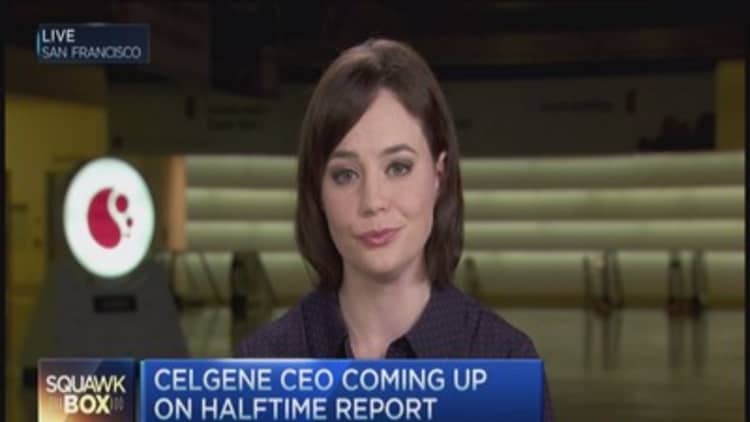A new health insurance company is hoping the Misfit will turn out to be a great fit for its business, and get customers a bit healthier in the process.
New York-based insurer Oscar launched on Monday an incentive program that offers its customers a free Misfit wearable fitness tracking device, and up to $20 per month if those people hit certain goals based on the number of walking or running steps they take in one day.
"It's a big carrot hanging in front of you," Oscar's co-founder Mario Schlosser told CNBC.com. "The original motivation was certainly that we want to give people a nudge to stay healthy."
As many as 20,000 Oscar customers will be offered the chance to download a Misfit app onto their smartphones that will monitor the device. After the Oscar-branded wristband is shipped and activated by the customer, it then automatically syncs to the app and the customer's insurance plan account.
Read More'Kickback' flak: Sanofi's caseload grows bigger
The benchmarks determined by an algorithm "start around 2,000 steps per day, that would be the early goal," Schlosser said. "If it sees you hit your goal every day for a week or so, then it would increase your goal.... Of course, it comes down again if you start missing your goal."
The maximum goal is "a bit over 10,000" steps per day, he said. "You don't have to be a triathlete to achieve this."
Customers are awarded $1 per day — with a $20 monthly cap — if they beat the benchmarks. The award is loaded on an Amazon.com gift card.
With Oscar's cheapest "silver" Obamacare plans costing about $405 per month in premiums, the Misfit program offers customers the incentive of a discount equal to more than 5 percent per month.
"We think it can be a very powerful tool to getting people out on the street and being more active," Schlosser said.
Read MoreWeek 2 for Obamacare enrollment slows—quite a bit
It also may be a tool to help Oscar make some money.
Part of the bet Oscar is making by handing out the Misfit devices, which has a $60 retail value, is to reduce the rate of health issues such as high blood pressure, obesity and diabetes among Oscar's customers. That, in turn, could reduce their use of doctors and hospitals, which Oscar's plan pays for.
Asked what the return on that investment might be per customer, Schlosser said, "I don't think anybody can completely answer that question right now.
"It will pay off, at best, in the medium term, if not the short term," he said.

But, Schlosser added, "It's potentially revolutionary, potentially incredibly impactful. If we were able to get everybody to do that, that would be a fantastic, fantastic outcome."
Schlosser said that for now the device will only track customers' steps, but noted it has the ability to track sleep, and that customers will be able to sync the device with Apple's HealthKit and other third-party health tracking programs.
Oscar, whose founders come from a high-tech background, has a history of offering financial incentives to customers in exchange for sharing information about their health, and of trying to tweak their behavior in a way that can reduce the insurer's overall costs.
Read MoreLawsuit claims 'kickback' scheme at Sanofi
When the still-small company began selling individual insurance plans on Obamacare health exchanges and outside those online marketplaces in New York and New Jersey last year, it offered customers $10 for answering 10 questions about their health in an online questionnaire. More than 80 percent of Oscar customers participated in that health questionnaire, Schlosser said.
The insurer also promotes a "televisit" service for customers, who can call a phone number at any time, 24 hours a day, to talk to a physician and describe a medical problem that they or a family member covered by the plan is experiencing.
"I'd say probably about one-third to 40 percent of our members have had some kind of televisit calls," Schlosser said.
Those calls represent visits to a doctor or hospital "that did not occur" because customers were able to get questions answered and medical advice over the phone, he said.
Oscar's Misfit program is being started just days after PricewaterhouseCoopers, in a report on health industry trends for 2015, identified "Do-it-yourself health care" and the use of wearable health devices as the No. 1 trend for next year.
Read More'Unprecedented' strides in hospital patient safety
"U.S. consumers and physicians are ready to embrace a dramatic expansion of the personal medical kit in 2015, thanks to technological innovation; the public's craving for convenience and a push to deliver lower-cost care. In response, technology companies are building intuitive mobile medical devices and apps that monitor vital signs, analyze blood and urine, track medication adherence and more," PwC's Health Research Institute said in the report.
"In the New Health Economy, high-tech personal medical kits could help diagnose illness, flag early signs of trouble, allow recovery and rehabilitation to occur closer to home and create virtual workforce capacity. They could enable consumers to take charge of more of their own care, even becoming co-creators of their personal health plans. They could allow clinicians to monitor patients in lower-cost settings, or even from a distance."
PwC's report noted that 20 percent of physicians said they already prescribe nutrition and weight-loss mobile health apps. And almost 90 percent of doctors "said these patient devices and apps will be important to their practices in the next five years," according to the report.


